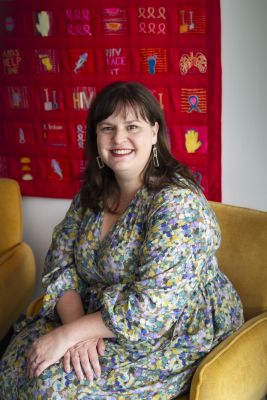 As we mark THINK’s 10th year of impactful work, we celebrate the dedication and expertise of our team of over 500 researchers and healthcare professionals who have provided care for over 0.5 million individuals in KwaZulu-Natal. Through our pioneering clinical research, we have influenced treatment guidelines worldwide and elevated the quality of care in South Africa and beyond.
As we mark THINK’s 10th year of impactful work, we celebrate the dedication and expertise of our team of over 500 researchers and healthcare professionals who have provided care for over 0.5 million individuals in KwaZulu-Natal. Through our pioneering clinical research, we have influenced treatment guidelines worldwide and elevated the quality of care in South Africa and beyond.
In the spirit of reflection, Dr. Suzanne Staples, our esteemed Chief Strategy Officer, is sharing her invaluable insights and experiences while working at THINK.
Q: Looking back on the past 10 years, what accomplishments of THINK are you most proud of?
A: Given that I have been with THINK since its inception and was one of the first three staff members, I have been fortunate to witness and be involved in numerous remarkable accomplishments, making it difficult to choose just one. Considering all of our successes, I believe that the greatest accomplishment of THINK is the organisation we have become today. When I first joined THINK, we were a team of only three people operating out of a two-room practice in City Hospital. Within a few months, we expanded to five staff members and conducted our first trial. Looking at THINK today, it is incredible to think back to those early days when we could not have imagined the current size of the organization and our projects or the state-of-the-art facilities we have now.
During our humble beginnings, we even resorted to purchasing second-hand equipment and refurbishing it ourselves. I remember fondly how the clinical trial team sat in the parking lot sanding down and spray painting the equipment. Despite being a small team, we were already deeply committed to THINK’s core values of dedication and passion, which helped us establish a reputation for quality and caring. This, in turn, led to more work and further growth for the organisation.
Today, we continue to prioritize these values and dedication, which serve as the foundation of our amazing organisation. It is a privilege for all of us to work at THINK, and I feel especially privileged to have witnessed the phenomenal growth of our organization.
Q: How has THINK’s work contributed to improving the lives of people affected by TB and HIV in South Africa and around the world?
A: THINK and its dedicated staff have made a significant impact in improving the lives of individuals living with TB and HIV, both on an individual level by providing treatment and on a larger scale by contributing to policy and system strengthening. Our efforts have not only benefitted patients, but also their families. As someone who started at THINK as a Principal Investigator, I would like to highlight the impact we have made on TB treatment.
Before 2012, no new TB drugs had been developed for over 40 years, making TB treatment a significant challenge, particularly for drug-resistant TB, where treatment was toxic and lengthy, lasting up to two years and including a daily injectable for six months. Since then, three new formulations have been developed, including Delamanid, Bedaquiline, and Pretomanid. THINK has had the opportunity to participate in clinical trials for all three the new drugs, helping to gather the necessary data to approve them for use as standard care in TB programs.
Through our research, we have been able to bring down the duration of drug-resistant TB treatment from two years to nine months and now to just six months. The impact of our efforts is incredible, and it is heartening to know that we have all contributed to saving lives and improving the quality of life for so many patients. I am excited to see what the future holds and what more we can achieve as an organisation.
Q: How has THINK’s approach to research and health impact evolved over the past 10 years, and what new directions do you see the organisation taking in the future?
A: When THINK first began, our focus was on conducting industry trials, where we implemented protocols developed by our industry partners, such as the pharmaceutical industry. While this work remains crucial, over the years, we have expanded our efforts by applying for independent funding through grants, allowing us to develop our own protocols based on research questions that we feel are impactful in our communities or raised from the needs identified in our other work.
This led to the formation of our research department, which includes both clinical trials and investigator-initiated research. As an example, we began to conduct social science-based work, aiming to better understand the lived experiences of the communities we serve. We have also started diversifying our research efforts, recognizing that many conditions are closely linked and impact each other, such as mental health and the impact of climate change on health and healthcare delivery. I believe that our future work will continue to align with this trend, where we remain attuned to the most pressing issues affecting public health and the quality of life of vulnerable populations. Our focus will also remain on identifying innovative approaches, such as the use of technology, to address these needs.
By expanding our focus and developing our own protocols, we are able to have a greater impact on the communities we serve and address a broader range of health concerns. Our commitment to continuous learning and innovation is what makes THINK such a special organisation.
